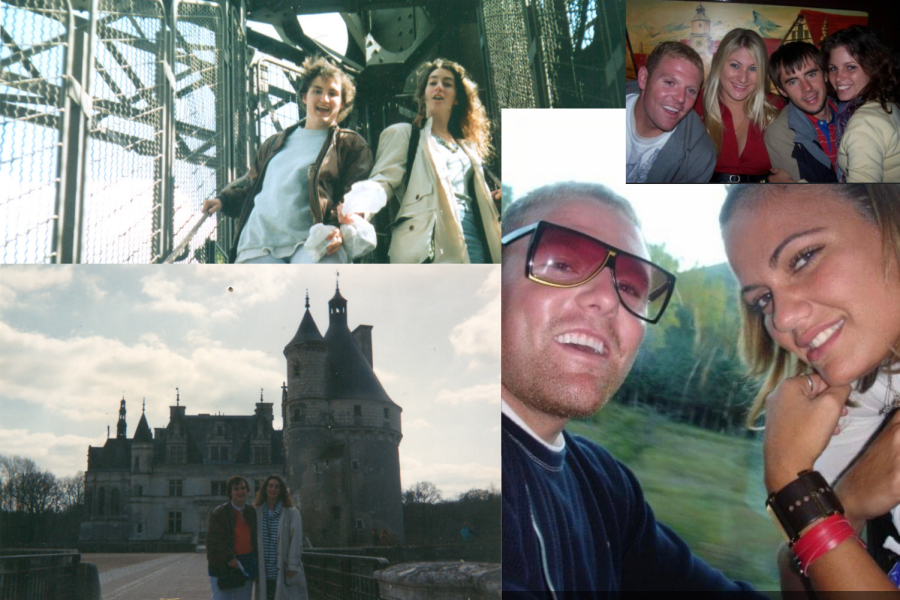Social Studies Teachers Share Their Study Abroad Experiences
Social studies teachers Deb Osborn and Joe Leiker share their experiences traveling abroad to Europe in a Q&A with The Blazer.
Apr 13, 2022
Walking along the Champs-Élysées in Paris, France during her junior year of high school, Deb 0sborn looked over into a café window and saw none other than Aerosmith’s Steven Tyler and Joe Perry sitting right there. A little over a decade later, college-aged Joe Leiker watched as bulls butted heads in Spain. These experiences were mere components of the ultimate adventure that can only be described as one of life’s most unique experiences: studying abroad. Both teaching Social Studies courses at GEHS, Osborn and Leiker are very avid lovers of the world and were gracious enough to share their stories abroad and some advice for those who are contemplating starting their own adventure abroad for a period of time.
Q: What do you teach?
Osborn – “Social Studies, generally. AP European History, Medieval and Renaissance Humanities, Sociology and Current Social Issues this year.”
Leiker – “I teach U.S. History and Honor’s Government.”
Q: Where did you live when you were abroad? For how long?
Osborn – “I lived in the town of Garches, [France], it’s a suburb of Paris. It’s actually right in between Paris and Versailles. [I lived there for] six months. I spent a semester [there] in my junior year of high school.”
Leiker – “I lived in Spain. Santander was the name of the town. I lived there for four months, a semester abroad, basically.”
Q: How did you get the opportunity to live abroad?
Osborn – My high school French teacher had a friend who was an English teacher at a high school in Paris. There was an exchange program where our kids would go there for a semester, and the other semester, their kids would come here. That’s how that happened. We would host their exchange students and they would host us.”
Leiker – “I was taking Spanish classes at Washburn and I was going to minor in Spanish. [The university] promoted this study abroad program and said if I went, I could get a degree and major in it. I thought it sounded like a really good experience, there were some scholarships available, and so I decided to just go for it and do it and I really enjoyed it.”
Q: What made you want to live abroad?
Osborn – “I had never gotten to leave the country and I had always wanted to, and I loved France and all things history and Europe and had been taking French for four years. I had traveled to France the previous year on one of those tours with a bunch of kids from my French class, and I wanted to go back and actually live with a family and experience actually being in France for longer than just going to the Eiffel Tower and just doing that sort of stuff.”
Leiker – * answered above *
Q: What was a typical day like living abroad?
Osborn – “Their schools are a little different because they … don’t have the same schedule every day, so some days you didn’t have to be there until a little later, some days you had to be there all day. I would usually get up, eat breakfast, get ready for school, and then go to school. We got quite a long lunch, it was an hour and a half. We always ate [at school], but they always had really good lunches because lunch is their main meal of the day instead of supper. On my way home, my job was always to stop at the bakery and buy fresh baguettes because they buy bread every single day there. That was one of my chores, was to stop and buy the bread to eat fresh at dinner and then you would eat it again the next morning for breakfast and etcetera. I would come home, do some homework, and then we’d do whatever we were doing as a family. It was a lot of fun, it really was. It sounds really boring, but it was actually really exciting. They took me all over Paris and all over that Northern part of France, it was cool.”
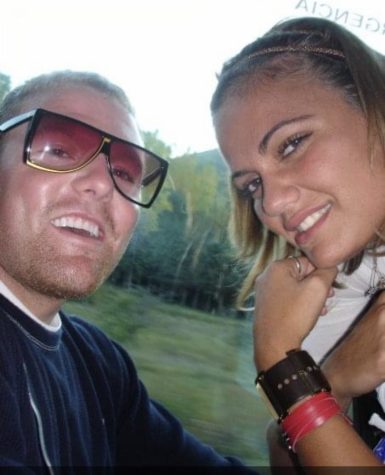
Leiker – “It wasn’t that different from being a student here. I would get up in the morning, eat breakfast with the family I stayed with, walk to school, and then we’d have classes until lunchtime at about noon. Then there was a siesta everyday, so there was nothing going on for two hours. You just kind of hung out and relaxed, you could take a nap … [I’d later] meet up with other students and go explore the town.”
Q: What were the hardest things to have to adjust to?
Osborn – “The hardest thing was when I first arrived, [I had to get used to] how quickly they spoke. Only being in my fourth year of French at that point, having to listen to how quickly they spoke and to start to pick words out, it took a while even though I knew some French – not as much as I probably should have. The first week I didn’t feel like I understood anybody and it was scary. I don’t think anything else was really hard to adjust to. This was before cell phones, and I basically did not talk to my parents at all except on Sundays because it was super expensive to call. The only time I talked to anybody back here was Sunday afternoon for a few minutes just to make sure I was okay because they really wanted me to be able to immerse myself [in France] so I wouldn’t get homesick and want to come home.”
Leiker – “Definitely just being so far away from everybody I knew and all the things I knew. And the language barrier, even though I was taking Spanish. In the real world, it goes a lot faster, and there were a lot of things I hadn’t learned and it was pretty intimidating. Also, all of the different traditions they had that we don’t know anything about, and that they didn’t have the ones that we’re used to. That was weird.”
Q: What was the easiest thing to have to adjust to?
Osborn – “The easiest thing to adjust to [was] the food. The food is fantastic. The culture’s fantastic. I really liked the freedom of walking everywhere. You could just walk everywhere you needed to go or you could take the metro – the subway, which I wish we had more of around here because [it’s more efficient]. You have to plan your timing better, but it’s awesome because you don’t have to deal with cars and all that kind of stuff, and you can just go anywhere. I liked how easy it was to travel and to travel anywhere.”
Leiker – “Probably that they lived a slower pace of life. They had very few responsibilities, so in that way, it was pretty lowkey and pretty relaxing.”
Q: What were some fears you had before living in a different country?
Osborn – “Could I do it? I mean, obviously, was I going to be able to speak or be understood? Was I going to get lost and not be able to find my way back? I also [was scared of] not seeing my friends. Fortunately for me, there were people I knew from my school who were over there at the same time, so we did see each other occasionally, so that was nice [and it] helped a little.”
Leiker – “Would I be able to navigate stuff? Would I be able to figure things out without much help and in a different language? What if I have trouble getting back or what if some crazy thing happens, like an international incident? All the big picture types of stuff.”
Q: Where were some of your favorite places you visited while abroad?
Osborn – “I stayed mostly in France on that particular trip, so I would say probably [when] we went down to the Loire Valley. That’s the area that’s southwest of Paris and it goes along the Loire River and it’s where all the big chateaus and the big castles are. We went to all the castles and that was really cool. We stopped at the city of Chartres which has this beautiful cathedral that I actually think is better than the Notre Dame because it’s all this 900-year-old stained glass. That particular trip was really cool. I also liked when we went up to Normandy and we went to the beaches of D-Day. Anywhere you go, especially if you’re living around Paris, there’s cool stuff. You round a corner and [there’s] something cool and amazing. I also went to a couple of raves and techno concerts, which obviously, I had not experienced back here.”
Leiker – “I really liked Barcelona. It was really cool. I enjoyed Rome a lot, [as well as] Switzerland. I got to see quite a bit of Europe because it’s pretty easy to get around once you’re there, but those ones really stood out. Andorra was [another cool place, it’s] a little ski village, this little country in the mountains.”
Q: If the opportunity ever came up, would you live abroad again?
Osborn – “Yes. Yes, in a heartbeat.”
Leiker – “I don’t think I would want to live there permanently, but I would definitely visit and do an extended stay or something like that again. Absolutely, if I had a chance to.”
Q: Do you have any advice for students who are thinking about studying abroad someday?
Osborn – “Do it. Get out of the United States and see the world. By the way, while you’re in the United States, travel and see things. Not [by] flying, but [by driving]. Drive through the countryside and see how other people live and see how other people experience the world and what they eat and what they do and what they like to go see. Experience as much as you can. That’s going to make your life so much richer. It’s the best thing I ever did. I’m really glad I focused my life on having adventures and going places and doing things and meeting people and seeing people because I think it’s made me understand people a lot better.”
Leiker – “I would say it’s definitely a worthwhile experience. It is a little intimidating, but it’s life-changing in a very positive way and I would encourage [students] to do it.”
Q: What are the things you miss most about living abroad?
Osborn – “I just liked how Europe is so easy to get from one country to the other and that there’s just this sense of you could go anywhere and do anything. It wasn’t hard and you could do it yourself. There was this sense of accomplishment that I kind of miss. I really enjoyed it.”
Leiker – “I miss some of the food that was really good and the ability to travel freely throughout Europe and see a lot of different things.”
Q: What are the things you miss least about living abroad?
Osborn – “There were a couple of things that I tried food-wise. The French have fantastic food, but there were a couple of dishes that were a little strange. We were served pigeon one time; that was odd. I [don’t miss] not having ice in my drinks because they don’t put ice in drinks there. If you ask for it, they act like you’re weird.”
Leiker – “Everything that you had to do [was] so difficult, like trying to figure it out, and having [everything take] really long. In some ways, it’s cool, but it can also be a little stressful.”
Q: What is one of your favorite stories from your time abroad?
Osborn – “My best friend and I were in Paris, we were on the Metro and we got separated from our group that we were with. This was shortly after we’d gotten there, so even though I’d been on the Metro before when I’d traveled the previous year, we didn’t really know where we were going. We were a little freaked out at first that we weren’t going to be able to find [our group]. This was before cell phones and all that kind of stuff so we really had no way to contact anybody. It ended up being really cool because we knew our stop to get back home so we just spent the night wandering through the streets. We stopped at a little café and we were up by Montmartre, which is this artist district [in Paris]. It’s up on a hill and it overlooks the entire city, and that’s where we were going anyway. We found our way there and we were sitting in that café eating crêpes – because, of course, that’s what Americans do when they go to France – and then our friends walked by us, and that was kind of cool that we had managed to find them even though we were totally lost. It was cool that we didn’t freak out and didn’t end up fetal on the floor of a subway station. It was fun, it was an adventure.”
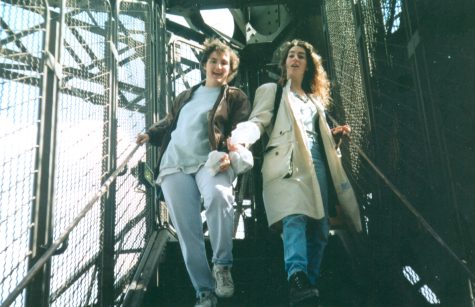
Leiker – “The best one is probably the day when we had class in the bathroom. We were learning the vocab for things in the bathroom and our professor took us there, the entire class, in the restroom, and the local news came. They filmed some of it and interviewed him and interviewed me all in Spanish. I had to try to navigate that, and I was on TV. My host family told me they saw me on the news. At the end of it, [my teacher] asked the reporter if he could ask him a question. [The reporter] said yes, and [my teacher] asked, ‘Is this the first interview you’ve done in a bathroom?’ [The reporter] said no. He didn’t give any context, so we were all confused.”
Q: Do you, or have you ever, found yourself using things you learned abroad?
Osborn – “Yeah. When I taught French class, I used a lot of their slang when I taught the kids. [I taught them] what the proper is, but also how [the French really] say it. Custom-wise, I do like wine with dinner. Here, we usually eat our salad first, but sometimes [the French] will eat [their salad] after they eat their main course because they put a vinaigrette dressing on it that helps break down your food. I find myself doing that sometimes, like instead of eating my salad first, I eat it last. They also sometimes have cheese platters for dessert instead of actual dessert – even though their desserts are ridiculously good – sometimes I do that. I try not to get too wrapped up in little stuff and stuff that doesn’t matter, but I do enjoy little things like being outside and enjoying the afternoon and reading a book and trying to take things a little slower. That I do a lot, because that’s how they do it.”
Leiker – “Yeah, a lot, especially when I first got back. There was a unique accent where I was, so I still spoke with a little bit of that accent every once in a while. [I use] some of the slang because it was different from what I’d learned here. That’s about all that’s really stuck over the long-term. Telling stories, or when something happens that reminds me of that [trip] is kind of harking back to that.”
Q: Do you ever try to incorporate things you learned while abroad into your everyday life?
Osborn – * answered above *
Leiker – “Sometimes. [I use] some of the things that they had over there that I hadn’t really seen or experienced, like the foods that I tried. Little things, mainly.”
Q: Was there anything that happened that you weren’t expecting?
Osborn – “Yes, many things. One time, we were on the subway in Paris and this guy got on. Right as soon as the train was starting, he set off a thing of tear gas. It flew back through all the cars. It’s about four or five minutes between stops, so that was kind of scary. [Being tear gassed] is awful. You’re crying and you’re coughing, and we ran upstairs to the open air and that sucked. [Another thing] that wasn’t expected: I met Aerosmith and Guns ‘n’ Roses on the Champs-Élysées. They were in France doing a big concert. Interestingly, Aerosmith was opening for Guns ‘n’ Roses, so that tells you how long ago this was, instead of Guns ‘n’ Roses opening for Aerosmith. [My friend and I] were walking down the street on the Champs-Élysées, which is the main boulevard that goes down to the Arc de Triomphe. It’s a big shopping street, [it has] a Ferrari dealership and Prada, all those houses of fashion. We knew that this was such a huge concert, because back when MTV still had music, they were going to broadcast this concert live. We were walking along and we looked over and we saw Steven Tyler from Aerosmith sitting in a café with their guitarist, Joe Perry. We were like, ‘Is that Steven Tyler?’ We went over and talked to them and got our pictures taken with them. They bought us lunch and it was really cool. We met Slash, the guitarist from Guns ‘n’ Roses, but we didn’t meet Axel Rose. We were more excited to meet the guitarist. Aside from meeting Prince in an elevator here once, I’ve never met anybody super famous.”
Leiker – “There were a lot of things. There were a lot of words I thought I knew that [I didn’t]. I tried to buy stamps, but I didn’t know the word. The word I used was not what they used and it took me two days to figure that out. The first day I was there, they took us on a tour and dropped us off at the last place and the bus left with our stuff on it. I had no key, I had no backpack or passport. That was really nerve-wracking because I wasn’t comfortable there yet at all. It all worked out, but the first few days, there were a lot of things that I was really nervous about and didn’t really know what I had gotten into.”
Q: What is one tourist attraction that is overrated? What’s one that is underrated?
Osborn – “The Eiffel Tower [is overrated]. It’s fine. It’s cool, but when you look at all the other things that Paris has to offer, [it pales in comparison]. There’s a couple of churches that are super amazing [that are underrated]. My favorite one is a chapel that I think is way cooler [than Notre Dame]. The Notre Dame is bigger, it’s more grand, but this chapel – it’s called Sainte-Chappelle, the Saint’s Chapel – has this amazing medieval vaulting in the basement, and then the whole upstairs is just an entire array of stained glass. Sainte-Chappelle, it’s amazing. It’s probably my favorite place to go in Paris.
Leiker – “The Eiffel Tower [is overrated]. It’s really cool, but once you get up there it’s just a good view. One of the coolest things that I didn’t really know much about that I [thought was underrated] was some of the plazas in Spain. Barcelona has the Ramblas, which is just a weird open market that just has everything there. I had just heard of it barely and didn’t have any idea what all I could find and do there.”
Q: Explain to me your food experience in the country you lived in compared to American food culture. What kind of food did you eat? What was the eating experience like?
Osborn – “Everything [in France] is good. Everything is made with these amazing sauces and it’s so good. They don’t eat a lot of fast food – they have fast food, but it doesn’t permeate the culture like it does here. Their McDonald’s is better than ours. Europe doesn’t allow them to use any high fructose corn syrup so it has to be pure sugar. Their ketchup tastes better. Their burgers are better, they have different standards for what beef they can use. But in terms of other food, you don’t have a bad meal in France if you’re willing to try things like escargot because everything’s in an amazing sauce and they have the best bread. The best bread, oh my God. You just can’t find it here … [When they eat,] they’re not in a hurry like we are. Lunch isn’t [quick], it’s leisurely. They eat their big meal usually at noon and then eat a smaller meal for dinner and they take time to do it, which is kind of nice. When you go to a restaurant, they don’t bring you the check until you ask for it. You have to ask for it or they won’t bring it to you. They will let you sit there for hours because it’s all about having the experience of dining and waiters and waitresses there are professionals, so the tip is included in the price of the meal. You don’t tip beyond that or they get offended. It’s not like here where people can get away without tipping, with [French waiters and waitresses], that’s what they professionally do. Eating meals at restaurants is an experience because they aren’t trying to shove you out to fill the tables … It’s much more leisurely and there are not a lot of fried foods. There are lots of vegetables.”
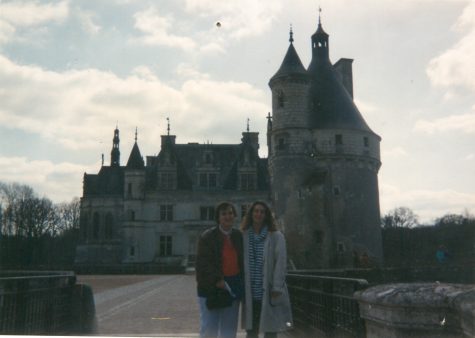
Leiker – “The timing was different. Lunch was their big meal. Their rhythm was different, and dinner was kind of like an afterthought late at night. Some stuff was the same, like they had cereal for breakfast. I lived near the ocean, so there was a lot of seafood and blood sausage. There was a potato casserole that was really good, and it took me a while to figure out what everything was. I wouldn’t say there weren’t a lot of ingredients that I hadn’t had, but the ritual around some of their meals were definitely different. When traveling, seeing how they did it in different countries [across Europe] was really neat.”
Q: What were some of the biggest culture shocks, either coming back to America or while abroad?
Osborn – “I did struggle with [not having ice in drinks] when I first went over there. When I came back [to America], I didn’t want ice in anything because I thought it was too cold. Obviously, I got over that. I was actually kind of surprised by how much American music and movies have made it over there, more so than I thought. They had malls, it was the 90s, so people still went to the mall. I guess the big shock was not having the freedom of my car. We used to drive around in our free time [in America], if you wanted to see your friends, you didn’t have a cell phone so you had to go pick them up and drive around. That was weird to not have that [in France]. But [I] adjusted pretty quickly.”
Leiker – “Everyone [in Spain] is pretty welcoming to Americans, [but in America], there isn’t that same reaction to people from other countries here. There’s more curiosity in Spain. [It was a shock] how interested they were in the United States. They wanted to know a lot and they seemed to know a lot about current events here. [It was shocking] how international they were; that was an eye-opener. The way that they seemed to be less stressed about daily life was another [shock].”
Q: How did you keep in touch with your family and friends that were still in America?
Osborn – * answered previously *
Leiker – “Skype, email and I had an international cell phone that was for emergencies and was super expensive. That was mainly it. Postcards were another one, but mostly Skype and email.”
Q: How did you make new friends while abroad?
Osborn – “I did have the advantage of knowing some people from my school who were there, and my best friend was there, though I didn’t see her that much. It was interesting to make friends. They were all very, very curious [about us] like how we are about them. They had a lot of misconceptions about us, but for the most part, they were very friendly. They [also] wanted to practice their English because they all speak English. They may not tell you they speak English because they don’t like that we won’t learn French, but they all know it and most of them study it in school. That helped. But they were super nice. It was pretty easy to make friends. They want to know about us.”
Leiker – “That was easier than I thought. I was kind of a shy person the first day I was there, hearing everything in a different language and not knowing anyone that was there. The first people I saw that looked American or like they spoke English or like they were around my own age, I would just walk right up and start talking. Survival kicked in. I think a lot of the other students that were American, in particular, were in the same boat so we bonded pretty quickly. There were also activities set up for us to do, so that helped.”
Q: How would you describe living abroad in 5 words?
Osborn– “The experience of a lifetime.”
Leiker – “Interesting all of the time.”
Q: How did you deal with homesickness?
Osborn – “I did get homesick once in a while. This was still back when we wrote letters, so I got letters from friends and I wrote letters to friends and family. I also talked to my parents once a week. They insisted on not more than that so that I wouldn’t get as homesick because I’d be busy being where I was. On Sunday nights we would talk for about ten minutes, and they just wanted to make sure I was okay. I think that’s the biggest thing, that with all of our instant [technology], kids go abroad now and they see all the fun things their friends are doing at home and they don’t immerse themselves in the [place they’re in]. It wasn’t as difficult for me to not be homesick because I was only there for six months and I wasn’t there during Christmas, I was there in the spring and summer.”
Leiker – “I just kept in touch with my family and I told them what I was doing. I tried to find some things that had some connection to home, whether it was eating a meal at an American chain restaurant once a week or watching something on TV that was an American show, things like that.”
Q: Did you participate in/attend any community activities like plays or sporting events?
Osborn – “They don’t have school-sponsored sports like we do, they don’t have any of those extracurricular activities. They do have community centers and they do extracurriculars there, it’s just not affiliated with the school. I did play some soccer. I learned how to play handball and also learned that I was not good at it. I did play tennis. They have a lot of concerts and plays, so I went to a lot of those. I went to a lot of activities. The one thing that I missed was the French Open because [it took place] after I left.”
Leiker – “I went to a bullfight a couple hours from where I was, which was unique. I saw a soccer stadium not far from where I lived that was a really big deal there. I went to a couple festivals around Halloween that were really big, and of course the ordinary things that we celebrate, too. But the bullfight was probably the most unique thing I went to.”
Q: What did you learn about yourself? Do you feel like you changed after living abroad?
Osborn – “Yes, [I feel like I changed]. Yes. Oh, my gosh, yes. I’m much more confident in my abilities to do things, much more confident that if things go wrong, I can figure it out, much more interested in things beyond where I lived. I always traveled a lot, my parents insisted upon it, but it totally changed my concept of the world and my concept of myself. I wasn’t very outgoing prior to going [to France]. I’m still not and I have to fight that, but I’m much more so.”
Leiker – “Yeah, I think I became more open to new experiences and maybe a little bit more outgoing. I had to make friends from scratch, and I think I became a little more independent and self-sufficient, having the confidence to know that I went halfway around the world and survived it and came out okay.”
Q: What were the locals like? Were there any stereotypes met?
Osborn – “The French are always seen as not liking Americans and there are definitely some that don’t. It comes from after World War II, when we kept trying to force our rule upon them and they just got tired of it. But are they suave? Are they sophisticated? Are they well-read and educated? Yes, they are. They really are, at least a lot of them. Obviously, there’s those that aren’t. I kind of expected them all to be snooty and they were not. They were very gracious, they could not have been more polite. [They were] incredibly polite people. Very kind. I think they had definite stereotypes about us. For example, the first week I got there, every meal [my host family] would ask me if I wanted a Coke. They bought all this Coke because they heard all Americans want to do is drink Coke. They just had weird conceptions like that.
Leiker – “I wouldn’t say a lot [of stereotypes were met]. They were very nice and welcoming and pretty excitable. The stereotypes of older people kind of fit them; in the house I lived in, the parents were very traditional. Not in a bad way, but the dad was very controlling, like he was going to make the rules and was the breadwinner and the mom did the cooking and cleaning and dressed up really nice every time she left the house. Stuff like that. The younger people were a lot more like we are here, [for example, they also have] less defined roles.”
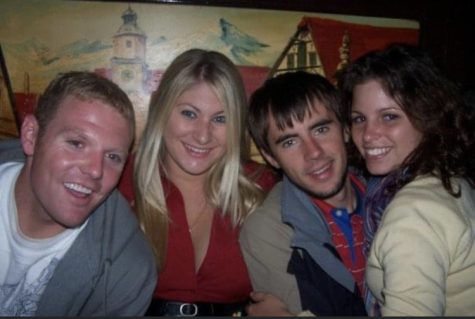
Q: What was the most common thing locals asked about American culture?
Osborn – “If it was a teenager, they wanted to talk about movies and music, like rock music, rap music etc. They have their music definitely, but they also were really interested in ours. If it was an adult, they were very interested in where I was from and what part of the country it was. Because I was from Kansas, they did know the Wizard of Oz, so they would always [ask me about it]. The adults were always interested in knowing about where you lived and what your family did. The kids were all interested in pop culture.”
Leiker – “They wanted to know about politics. That was before the 2008 election, so they wanted to know what we thought over here. They wanted to know what we thought about their country. We didn’t spend a lot of time talking about their country, so that was always an awkward thing to say. They paid a lot of attention to our [country], so they wanted to know if we paid attention to theirs.”
Q: Is there anything else you would like to add?
Osborn – “You have to be willing to live their lifestyle and live the way they live. You’re a guest in their culture and it’s not going to be exactly what you have here. You don’t want it to be because then you aren’t having that experience. It is scary. It takes a while to get used to it, but just don’t give up and don’t come running back home. The other thing I would add is to not never call your parents, but [somewhat] separate yourself so that you can have that adventure. If all you’re doing is wondering what’s going on at home, you’re not going to get anything out of it.”
Leiker – “I picked up more Spanish in a week of living there than I did in all of my classes that I had taken for years. It was a really interesting experience, I learned all kinds of stuff that I probably still couldn’t articulate. It just kind of happened by being immersed in the culture and the language. It was definitely a worthwhile experience. Some times were definitely stressful and scary but overall, it was great.”



